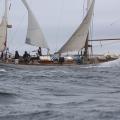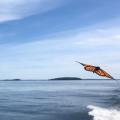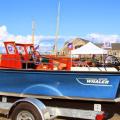The University of Maine Pelagic Fisheries Lab directed by assistant professor Walt Golet has received a five-year, $250,000 commitment from the Bass Pro Shops and Cabela's Outdoor Fund to deploy electronic tags on Atlantic bluefin tuna.
The Outdoor Fund is a not-for-profit charity that rallies Bass Pro Shops and Cabela’s 200 million customers to support conservation programs across North America by rounding up their purchase totals in-store and online at checkout. This support directly promotes the conservation and wise use of one of the most highly valued resources in the ocean.
Atlantic bluefin tuna are one of the largest and most sought-after fish in the ocean. As a seasonal visitor to the northwest Atlantic, they play an important ecological role in structuring pelagic food webs. Beyond their commercial value, the fish provide the foundation of fishing tourism and charter boat businesses in coastal communities.
Not only do these important fish travel widely, they do so quickly — Atlantic bluefin tuna can travel from Florida to Norway in 50 days. Studying and managing an animal with such extensive migratory capacity is challenging. The development of electronic tags has provided a way to collect data on where these fish go, the temperature of the water they swim in and their vertical utilization of the ocean. Data made available from these tags provides important information for biologists and fisheries managers.
Using these tags, scientists can estimate important parameters, such as mixing rates between the two bluefin management units, residency in those different management units, the timing and location of spawning. This data allows managers to set scientifically based quotas to ensure long-term sustainability. Such sustainability buffers fishing communities against the historical ups and downs of exploitation and recovery that result in ecosystem perturbation and economic hardships.
“This support comes at a critical time when the data needs of a completely new Atlantic bluefin tuna assessment and management model have just been accepted by the international community,” says Golet, who most recently received U.S. Department of Commerce funding to use tags to quantify the number of Atlantic bluefin tuna in New England that die after being caught and released. “These tags will provide critical pieces of information that will be used by international managers to conserve this iconic species to maintain its importance stabilizing pelagic food webs, supporting coastal communities, and providing angling opportunities for generations to come.”
Twenty electronic tags were deployed on Atlantic bluefin tuna this year in the northwest Atlantic ranging in size from 600–1,000 pounds. By fall 2023, the tags will begin transmitting their data back to the Pelagic Fisheries Lab where Ph.D. student Kaylyn Zipp will use the data to recreate a year in the life of an Atlantic bluefin tuna.
The lab, based in the UMaine School of Marine Sciences, studies the life history of highly migratory species, such as tunas, sharks and billfish to improve stock assessments and long-term sustainability of these resources in the Atlantic Ocean. Golet chairs the U.S. International Commission for the Conservation of Atlantic Tunas (ICCAT) and leads the Pelagic Ecosystem Research Consortium to enhance the stock assessment, management, and sustainability of highly migratory species.











